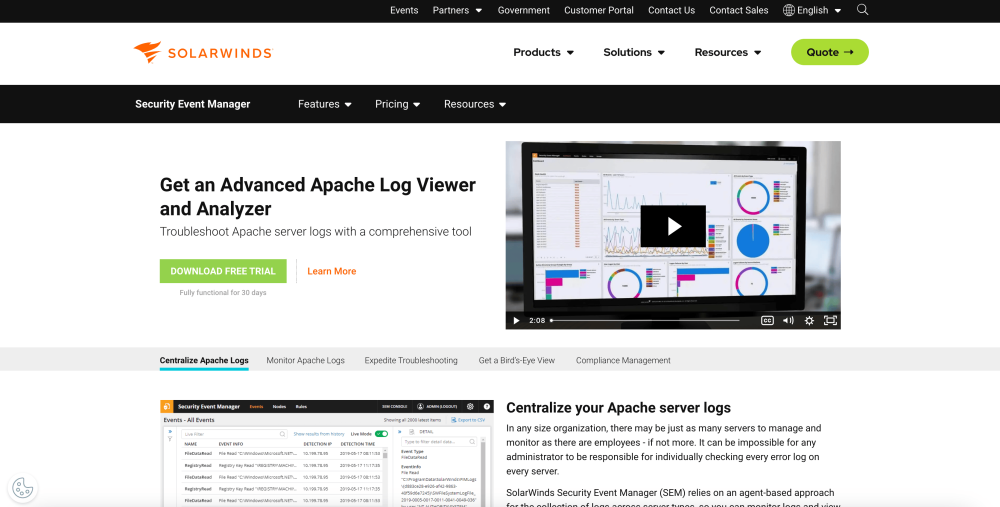Resources
6 min read
Monitoring Apache logs is crucial to ensure the health, security, and performance of web servers running the Apache HTTP Server software. Analyzing these logs continuously will, in turn, provide invaluable insight into web server activities related to web traffic patterns, user behavior, server errors, potential security threats, and performance metrics.
Monitoring Apache logs helps organizations adhere to compliance requirements, and improve website reliability, and security from malicious cyber threats, including DDoS attacks, unauthorized access attempts, and web application vulnerabilities. Traditionally, teams often rely on methods like Grep to troubleshoot Apache errors; this can be ineffective when your logs are across a variety of locations within a distributed environment.
To simplify the process of troubleshooting and monitoring Apache logs, numerous organizations turn to an Apache log viewer. This tool is essential for monitoring the most important Apache log fields and metrics, and it will provide actionable intelligence for engineers to enhance the performance of their web servers.
So, to deepen your understanding of Apache logs and an Apache log viewer, in this article, we will define what Apache logs are and their key components, the importance of these logs, and use case before listing the leading Apache log viewers.
Contents
What are Apache Logs?
Apache logs are files created by the Apache HTTP Server, an open-source web server software widely used in the world. They record detailed information on interactions between an Apache server and clients, browsers, applications, or other servers, concerning web server activity. Apache logs provide valuable information on IP addresses of the clients, URL requests, HTTP methods used, status codes returned, bytes transferred, and much more.
Key Components of Apache Logs
Understanding the components of Apache logs allows web administrators and developers to understand and analyze web server activity comprehensively. The key components of Apache logs are listed below.
- Remote Host/IP Address: Identifies the IP address or hostname of the client making the request to the Apache server.
- User Identity: Provides information about the user making the request, if authentication is enabled.
- Date and Time: Records the date and time at which the request was received by the server.
- HTTP Method: Specifies the HTTP method used in the request, such as GET, POST, or HEAD.
- Requested URL: Indicates the URL of the requested resource.
- HTTP Status Code: Specifies the HTTP status code returned by the server in response to the request.
- Bytes Transferred: Indicates the number of bytes transferred in the response to the client.
- User-Agent: Provides information about the client's web browser or application making the request.
- Referrer: Specifies the URL of the referring page, if any, from which the request originated.
- Server Name: Identifies the server's hostname, generating the log entry. This is particularly useful in environments with multiple servers.
- Virtual Host: Indicates the virtual host to which the request was directed, in configurations with multiple virtual hosts.
The Importance of Apache Logs
Apache logs offer numerous advantages to organizations, highlighting their importance an example is using these logs for effective troubleshooting and fixing issues. Very detailed information about client requests, server responses, and error codes enables administrators to pinpoint and diagnose the problem quickly. Whether pinpointing the cause of server crashes, application errors, or performance bottlenecks, Apache logs have all the data necessary to help administrators solve and fix issues fast and effectively, while simultaneously reducing downtime and improving overall server reliability.
Apache logs also play an important role in improving security monitoring. They log all accesses, both successful and failed, security-related events like access attempts to restricted areas and other potentially harmful activities. Analyzing these logs regularly allows the security teams to uncover and act upon suspicious activities, like brute-force attacks, unauthorized access attempts, and a variety of other cyber threats. In this way, such proactive monitoring will help protect sensitive information and web application integrity.
Additionally, the performance optimization aspects are another benefit that can be derived from Apache logs. These logs offer a wealth of information on server performance metrics like response times, request rates, and resource utilization. By looking at this data, administrators can identify where the server slows down due to overloads and queues at various points. This way, they can make decisions that relate to optimum allocation of resources hence improving the time it takes for a user’s request to be received by the server. It creates an environment where users have an excellent experience while still saving on resources used by servers.
Lastly, Apache logs provide invaluable data about traffic in terms of user behavior, popular content, and traffic patterns. Analyzing these logs enables a business to understand its audience better, identify high-traffic time frames, and define what content or services are most used by users. This information is crucial to making informed decisions related to content strategy, marketing efforts, and capacity planning, hence improving business outcomes.
Apache Logs: Use Cases
Apache logs can be applied to a range of use cases, one of these applications is troubleshooting and solving problems of web application or server failures. For example, Apache logs are a really important tool for developers to trace and debug errors in web applications. Logs include detailed error messages and trace line information about where and why an error happened. For example, if a web application generates a “500 Internal Server Error," the logs can show whether the issue is a coding bug, a problem in the configuration of the server, or the breakdown of an external service. This information allows debugging at a much faster pace, helping developers quickly repair problems and push stable updates live.
Also, Apache logs can be parsed and analyzed to generate custom reports and analytics that best fit the business needs. Log data can be used to build dashboards displaying key metrics, such as active daily users, page load times, and error rates. These tailored reports give insight for the key stakeholders—from IT administrators monitoring server health to business management monitoring user engagement and key performance indicators.
Lastly, Apache logs serve an important role in capacity planning, ensuring that the web server infrastructure grows sufficiently to meet future demands. By analyzing traffic volumes, resource usage, and peak load times, organizations will be able to forecast future growth and plan necessary upgrades accordingly. For example, if logs are showing steady month-over-month traffic growth, it might be time to invest in extra server capacity or more robust load-balancing solutions that can maintain performance and availability.
The Top Apache Log Viewers
Datadog

With Datadogs Apache Log Viewer tool you can discover log patterns and errors without the need to investigate, read every individual log file, and begin visualizing and exploring collected logs using a facet-driven navigation designed for outage responders. As well as this the tool can be used to access archived logs dating back to any time with the ability to rehydrate logs into indexes in a few simple clicks.
Logit.io

Logit.io offers a specialized Apache Log Viewer and Analyzer tool that operates in full compliance with SOC 2, ISO/IEC 27001, GDPR, PCI & HIPAA and even provides regional data centers for users that wish to ensure localized compliance. As well as this, Logit.io is significantly simpler to configure than free Apache log viewers as you can launch our analysis dashboards within minutes of registering. Also, the tool utilizes Hosted Logstash for automatic logging and forwarding, allowing you to parse, process, and format all your Apache logs and metrics.
If you’re interested in finding out about the full capabilities of Logit.io’s Apache Log Viewer and Analyzer then feel free to contact us or begin exploring the platform for yourself with a 14-day free trial.
SolarWinds

SolarWinds Apache Log Viewer is designed to streamline the monitoring and analysis of Apache logs, enabling rapid troubleshooting and investigation of security and performance issues. It facilitates the immediate identification of security breaches through real-time, in-memory correlation, making it easier to address potential threats and performance bottlenecks efficiently. Also, the tool can help detect these patterns more easily with Apache web server logs visualization capabilities.
If you've enjoyed this article why not read What is Log Analysis or Everything You Need To Know About Log Viewers next?
